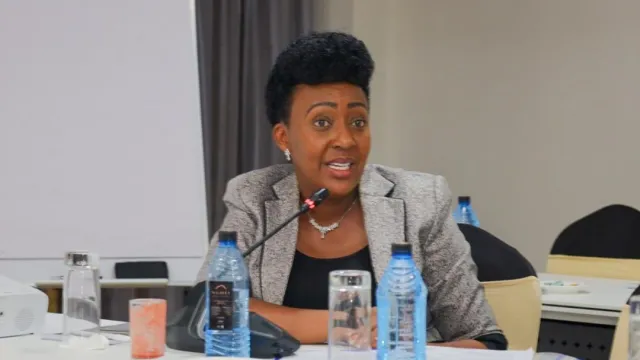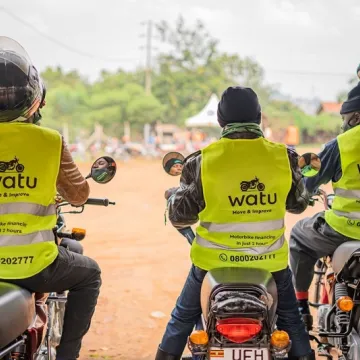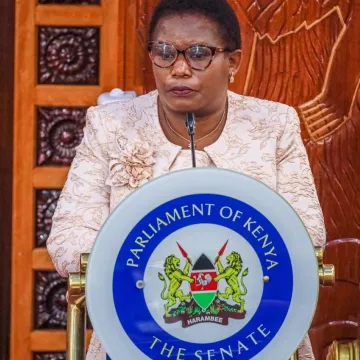Senate’s Sh465Bn for counties set to spark budget tug-of-war with MPs

Senate's Finance and Budget Committee vice chairperson, Tabitha Mutinda, says counties are currently burdened with heavy non-negotiable financial obligations imposed by national directives.
The Senate has approved an allocation of KES465 billion for county governments in the 2025 Division of Revenue Bill, paving the way for renewed tug-of-war with the National Assembly, which had previously backed a lower amount of KES405 billion.
The Division of Revenue Bill (DoRB), 2025 is a key legislative proposal that sets out the equitable allocation of nationally raised revenue between the two levels of government for the 2025/26 financial year. The DORB was published on March 12, 2025, and tabled for its first reading in the National Assembly on March 14, 2025.
Key allocations proposed in the first draft of the Bill included total shareable revenue worth KES2.835 trillion, national government allocation at KES2.419 trillion, county governments’ equitable share set to be KES405.1 billion (an increase of KES17.6 billion from the previous year) and the equalization fund at KES10.589 billion. This includes KES7.853 billion for 0.5 per cent allocation and KES2.737 billion in arrears.
The disparity between the proposed figures has reignited the long-standing tug-of-war between the two Houses, potentially stalling the budget process and sparking renewed concerns about the sustainability of devolved functions.
The Senate’s version of the Bill was championed by the Finance and Budget Committee, whose vice chairperson, Tabitha Mutinda, said counties are currently burdened with heavy non-negotiable financial obligations imposed by national directives.
“These counties are being forced to shoulder non-discretionary expenditures amounting to KES 34 billion, imposed by national government directives,” Mutinda said.
She listed KES4.1 billion for the Housing Levy, KES6 billion for the National Social Security Fund, KES11.8 billion for County Aggregated Industrial Parks, and KES3.23 billion for community health promoter payments among the mandated costs.
Other obligations include KES6.3 billion for annual wage increments under the Integrated Payroll and Personnel Database and KES3.5 billion for doctors’ salary increments tied to the 2017 Collective Bargaining Agreement and return-to-work deals.
Meanwhile, Aaron Cheruiyot, the leader of the majority in the Senate also supported the new proposition but expressed concern about how counties spend their money.
“About 34 out of 47 counties spend more than 50 per cent of their shareable revenue on recurrent expenditure,” he said.
According to the legislator, less than 10 counties allocate more than the statutory 25 per cent on actual development.
Thus in reference to the Public Finance Management Act, Cheruiyot questioned the justification for increasing county allocations when more than three quarters of it is used to pay wages.
“It makes no sense to fight for KES400 billion or KES450 billion for counties when 90 per cent of that money is misappropriated. Why should we send that much if over half of it is used to pay 300,000 to 400,000 people, excluding millions of others?” he asked.
In a dispatch accompanying the Bill, National Assembly Speaker Moses Wetang’ula defended the KES 405 billion figure passed by the members of parliament, saying that it reflects current revenue performance and includes an increase of KES 17.6 billion for the 2025/26 financial year.
“This figure was guided by the government’s commitment to a fiscal consolidation plan aimed at reducing the fiscal deficit to 4.3 per cent of GDP. This is intended to slow the accumulation of public debt, improve the primary surplus, and enhance fiscal sustainability,” Wetang’ula said.
He added that global economic disruptions, supply chain issues, and rising US interest rates had contributed to reduced revenue, impacting the country’s financial flexibility.
Wetang’ula also noted that counties have continued to receive their full allocations even when the national government suffers revenue shortfalls.
“Article 218(2)(b) of the constitution requires that revenue sharing between the two levels of government consider criteria outlined in Article 203(1), including national interest, public debt and the needs of disadvantaged areas,” he said.





